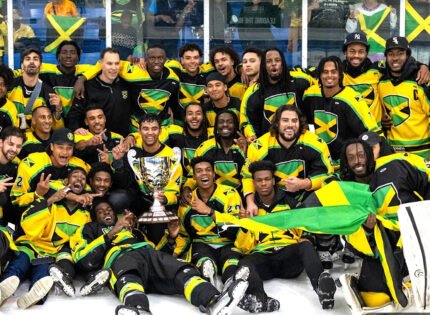Divided we stand, but united we will fall… unless
Last Septem ber, U.K. Prime Minister David Cameron made a state visit to Jamaica
ber, U.K. Prime Minister David Cameron made a state visit to Jamaica
and some unfinished business, which probably wasn’t on his itinerary, came up: Reparations.
For years Black people, initially in the U.S., but increasingly wherever we were dropped off, have been demanding redress for Europe’s humanitarian mess, which began when white explorers landed on African shores.
So, as Black people in the [African] Diaspora become increasingly assertive, they/we continue to clamor for restitution for centuries of all that Slavery entailed (beginning when those old Europeans saw the potential, not only of Africa’s abundant natural resources, but also its bountiful human resources). The result of their dirty work yesterday has become a burning and perennially contentious issue today.
Like a stubborn forest fire, when the firefighters think they have it under control, it’s only smoldering… then it flares up again.
Anyone who’s interested knows the history of African slavery and its lingering effects on Black people everywhere. Meaning those around the world that [economically] benefitted from slavery have work to do: address the issue of Reparations; it won’t be going away anytime soon. It will continue to flare up like that stubborn forest fire.
And each time there’s another news story about Reparations, there will be push back by the beneficiary.
Check some of these headlines that flared up when Cameron went to Jamaica:
U.K. Prime Minister David Cameron Dismisses Jamaican Demands …
Slavery Reparations call overshadows Cameron’s visit to Jamaica
Britain, Jamaica, and the Looming Battle Over Reparations
David Cameron rules out slavery reparation during Jamaica visit
Britain Says No to Slavery Reparations…
British taxpayers are not to blame for the horror of…
Britain to Jamaica: In Lieu of Reparations, Here’s a Prison…
If you’re thinking there’s disinterest and resistance… by the primary purveyors (and beneficiaries) of the Slave Trade and its long-term effects on its victims (some of whom are now positing that the ‘system’ has had a deep-rooted psychological impact on the descendants of that historic, dubious economic pursuit), to any notion of Reparations, then those headlines are quite telling.
So detached from the matter of Reparations was the British Prime Minister that he had the audacity to offer the Jamaican government 25 million pounds to construct a new prison (new prisons), ostensibly to house people of Jamaican background who had committed various offences in England, and will be deported. People, no doubt predominantly Black (progeny of said slaves), whom Britain would be too happy to rid itself of.
That’s just what every developing country needs to uplift the people and help grow the national economy, prisons.
The British Prime Minister’s offer is characteristic of other European leaders whose countries helped plunder Africa, but treats Africans with disdain.
Maybe in a case of unmitigated, nationalistic, island hubris, the Jamaican government was attempting to broker a singular deal with Britain; it was a no-brainer from the get-go. With a relatively powerful demographic controlling the African Slave trade, the government was hoping British Prime Minister David Cameron would be receptive by responding favourably to the Reparations request. When all was said and done, London had a conciliatory offer, the 25 million pounds for that questionable project.
Essentially the British Prime Minister told Jamaicans “To get over it.”
[Here’s some irony, “supporters of Reparations…argue that slave owners were compensated.” Apparently, when Britain emancipated slaves in 1833…£17 billion in compensation was granted to 46,000 of Britain’s slave-owners for ‘loss of human property’.”]
I listened to CBC Montreal’s “Daybreak” when the story broke, and two Montrealers of West Indian background were invited to have their say on the subject of Reparations. In a word they were “pissed.”
Of course, like most Black people (I can’t say all, but believe it, like most white people, there are Blacks who also believe “We should just move on, “get over it,” forget about Reparations…”) they agreed with the dominant Diasporic perspective, with good reason.
When we hear/read news stories of people around the world who were historically ‘hard done by’ being publicly apologized to, and financially compensated, one must ask: What about that atrocity of slavery perpetrated against people of African descent on the continent of Africa, in the Americas, and elsewhere? Are we not people who also deserve an international apology from those European countries, and the USA that were the major beneficiaries of the inhumane system of still unpaid human labour?
Where’s the reparations cheque? The forty acres and a mule and whatever else was promised once the untenable system of human exploitation, repression and destruction (de facto genocide) had forcibly run its long historic course?
“I do hope that, as friends who have gone through so much together since those darkest of times, we can move on from this painful legacy and continue to build for the future,” Cameron said in an address to MPs in Jamaica’s parliament, calling slavery “abhorrent in all its forms,”
“These wounds run very deep,” he said, adding that Britain’s role in wiping slavery ‘off the face of our planet’ should never be forgotten.”
In a [African] reparations context, here’s something to ponder on; it’s a continual atonement for that ethnocentric, cultural, historical wrong perpetrated by one specific group of humankind against another.
For example, on the eve of what was supposed to be a visit to Germany by Israeli Prime Minister Benjamin Netanyahu several weeks ago (it was cancelled due to another round of the recurring Israeli-Palestinian bloodletting… and “security” issues), Chancellor Angela Merkel of Germany is quoted as saying, “The Holocaust remains Germany’s responsibility…”
Germany has made amends…
That’s the same Germany that was implicated in the colonization of several African countries (German African protectorates: Tanzania, Rwanda and Burundi, Togo, Cameroon, Uganda, Botswana, Namibia…) prior to and during World War 11, which included some where it established military and communication outposts, ostensibly to keep tabs on allied forces and their activities at the time.
Like other European countries in that colonial era, Germany had aspirations of building [its] empire in Africa under the guise of “fighting slavery and the slave trade.”
African-Americans have been bandying around the idea of Reparations for several years, without consequence. During a campaign stop in Minneapolis, Sen. Bernie Sanders came face to face with some Black folk during a Black America forum; their issue was Reparations, something successive U.S. governments have had an aversion to.
Said someone in the audience to Sanders:
“It seems like every time you talk about Black people, and us getting something for the systemic oppression and exploitation of our people, we have to include every other person of color…”
The crowd was urging the presidential nomination contender to “talk specifically about Black people and reparations.”
Another Black American in Sanders’ forum said, “Reparations is not one possible tool against white supremacy. It is the indispensable tool against white supremacy…Reparations is not one possible tool against white supremacy. It is the indispensable tool against white supremacy. One cannot propose to plunder a people, incur a moral and monetary debt, propose to never pay it back, and then claim to be seriously engaging in the fight against white supremacy.”
So why did Jamaica, a little Caribbean island, think that asking England for Reparations would be successful?
Africa’s children were collectively gathered and shipped, albeit on different ships to different Caribbean islands, places in the Americas and elsewhere. It was collective enslavement, oppression and repression on and of the continent.
The sooner governments on the continent of Africa, in the Caribbean, the Reparations proponents in the USA, and those in smaller Black nations scattered around the world realize that any talk of reparations must literally be a collective global effort, the sooner those who benefitted from slavery will begin to take the issue more seriously.
The Reparations fight must be a global [Diasporic] effort. There’s up to $14 Trillion, due people of African descent, according to some estimates. Which is why all the Reparations forces must coalesce. Or else Divided we will continue to stand and fall.













